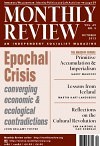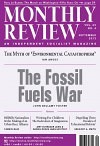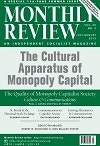Political Economy
The rediscovery over the last decade and a half of Marx’s theory of metabolic rift has come to be seen by many on the left as offering a powerful critique of the relation between nature and contemporary capitalist society. The result has been the development of a more unified ecological world view transcending the divisions between natural and social science, and allowing us to perceive the concrete ways in which the contradictions of capital accumulation are generating ecological crises and catastrophes.… Yet, this recovery of Marx’s ecological argument has given rise to further questions and criticisms. | more…
Structural Crises and the Need for Alternatives to Capitalism
On Thursday, December 13, 2012, The Guardian announced Queen Elizabeth finally received an answer to her question—”Did nobody see this coming?”—about the 2008 financial crisis.… Perhaps she could have also asked three more questions: Does nobody see the suffering and socioeconomic injustices of oligopolistic-finance capitalism? Does no one see that the problems are structural and systemic? And is there no alternative to a system that generates continuous “quadruple crises”—the socioeconomic, political, environmental, and personal/psychological?… The conventional wisdom is “There Is No Alternative,” or TINA. For this reason most Americans simply acquiesce to capitalistic social relations and, like Sisyphus, are resigned to performing eternal tasks while enduring the “endless” quadruple crises generated by a pathological system.… The most extraordinary aspect concerning the absence of an alternative is that it is fallacious. The capitalistic system itself must be transformed. To put it into a slogan: Capitalism Is No Alternative, or CINA. | more…

A sign of the crass economic culture of our times is the recent release by Hasbro of the game “Monopoly Empire” based on the well-known “Monopoly” game, first mass produced in 1935 by Parker Bothers, now a Hasbro subsidiary. The new version can be played in thirty minutes and is designed to take the friction out of the game while glorifying the modern corporate system. Players collect iconic brands of corporations such as McDonalds, Coca-Cola, Nestlé, and Samsung, which they add to billboard “towers” in a race to the top. Players no longer leave the game due to bankruptcy. The goal is simply to build the biggest monopoly brand empire. | more…
It is an indication of the sheer enormity of the historical challenge confronting humanity in our time that the worst economic crisis since the Great Depression, sometimes now called the Second Great Depression, is overshadowed by the larger threat of planetary catastrophe, raising the question of the long-term survival of innumerable species—including our own. An urgent necessity for the world today is therefore to develop an understanding of the interconnections between the deepening impasse of the capitalist economy and the rapidly accelerating ecological threat—itself a by-product of capitalist development. | more…
Capitalism, Crisis, and Resistance
If we are to build support for an alternative to capitalism we need clarity on the causes and consequences of the contemporary capitalist drive for greater liberalization and privatization, as well as the benefits from and limits to state direction of capitalist economic activity. Although a small country, Iceland’s recent experience has much to teach us about capitalist dynamics and strategies of transformation. | more…
The biggest internal debate absorbing the world left for at least the last seventy-five years has been whether identity is a left concept and therefore a left concern. In 1950, most activists on the left would have said no. Today a majority would say yes, indeed. But the debate remains fierce. | more…

When confronted in the 1980s with the failure of the younger generation of economists (both mainstream and radical) to take seriously the issue of the return of economic stagnation, Harry Magdoff and Paul Sweezy stated in their book Stagnation and the Financial Explosion (Monthly Review Press, 1987, 12): “There is a temptation to say: just wait and see, you’ll find out soon enough…. But it would be a cop-out to leave it at that. We owe it to our readers at least to try to make clearer what we mean by stagnation and why we think it is so important.” They proceeded to do exactly that, producing a work that in terms of the trends of the last quarter-century has to be regarded as prescient.… Today, decades later, we can see the depth of the stagnation tendency of monopoly capitalism finally dawning upon some of the most realistic and competent of mainstream economists. | more…

A Note from Bob McChesney. During my time as coeditor [of MR], communication colleagues would sometimes wonder what I was doing at MR. After all, I was a media scholar, and MR was many things, but it was not a magazine known for its work on communication. I explained the singular importance of the MR tradition, of the work of Sweezy, Magdoff, Leo Huberman, and Paul Baran, in my intellectual and political development. I also explained the importance of the MR work on advertising, monopoly, and technology in developing a radical critique of media and communication. But I had to concede the point, nonetheless.… Imagine my surprise, then, when Foster informed me two years ago that two drafts of a missing chapter of Baran and Sweezy’s magisterial Monopoly Capital (1966) had been discovered in their papers. Not only that, it was a chapter on media and culture. I was shocked, to say the least. Foster provided me with the backstory: it was meant to be the penultimate chapter of the book, but when Baran died in 1964, Sweezy elected to leave it out (after doing additional work on it) as the book was already quite long and there remained unresolved issues with it. | more…
The past half-century has been dominated by the rise of media to a commanding position in the social life of most people and nations, to the point where it is banal to regard this as the “information age.” The once-dazzling ascension of television in the 1950s and ’60s now looks like the horse-and-buggy era when one assesses the Internet, smartphones, and the digital revolution. For social theorists of all stripes communication has moved to center stage. And for those on the left, addressing the role of communication in achieving social change and then maintaining popular rule in the face of reactionary backlash is now a primary concern.… political economists of communication, including one of us, identified themselves as in the tradition of radical political economy, but with a sophisticated appreciation of media that had escaped.… [the stellar critique of journalism produced… by Edward S. Herman and Noam Chomsky]. Paul Baran and Paul Sweezy were occasionally held up by political economists of communication as representing the sort of traditional Marxists who underappreciated the importance of media, communication, and culture.… We were never especially impressed by this criticism. To us, Monopoly Capital, and the broader political economy of Baran and Sweezy, far from ignoring communication, provided key elements for a serious study of the subject. [Note: this article was released in three parts: Part 1 | Part 2 | Part 3] | more…
Confronted with a progressive deterioration and an increasing “Americanization” of mass media in Britain, the British Labor Party appointed a Commission under the Chairmanship of Lord Reith the assignment of which is “to consider the role of commercial advertising in present day society and to recommend whether reforms are required; if so, what?” This Advertising Commission solicited oral and written testimony from various workers in that field, submitting to them a questionnaire covering the principal points on which comments were invited. Having also been asked for our reflections on the matter, we prepared the following statement the purpose of which is not so much to answer all the questions posed in the questionnaire, as to present a more or less integrated view on this, most important, subject. | more…
This is a hitherto unpublished chapter of Paul A. Baran and Paul M. Sweezy, Monopoly Capital (New York: Monthly Review Press, 1966). The text as published here has been edited and includes notes by John Bellamy Foster. The style conforms to that of their book. Part of the original draft chapter, dealing with mental health, was still incomplete at the time of Baran’s death in 1964, and consequently has not be included in this published version. For the larger intellectual context see the introduction to this issue.
It matters greatly where you start, in thinking about communications. You may start, for instance, in a mood of excitement and even congratulation that at the present stage of civilization there is a communications system incomparably more vast and efficient than could ever have been imagined: that the voice of radio, the face of television, goes into millions of homes, and that we have the most widely distributed press in the world. You can feel this excitement even if you recognize certain little local difficulties such as a cigarette advertisement appearing just before Robin Hood, or a particularly shocking series in one of the Sunday papers, or even the overnight death of the News Chronicle.… On the other hand, you may be starting from the feeling that never in the history of the world has there been so much production of bad culture. Never, it is true, has there been so much production of any kind, but the percentage of this production which is bad is now appalling.… Many people, good people, have this image of a depraved, or largely depraved, population, whom they call the masses. The people are not profiting by the gleaming machine of communication, but are being reduced to what is usually called a near-moronic mass.… My own starting point is distinct from either of these attitudes. In my view you cannot understand the communications system unless you look at it historically, and this as yet we have not really enough evidence for. Very few people have been working on it.… and because of this, such history of the communications system as exists is mostly bad history, bad history which hides from us the factors which could lead to an understanding of the contemporary situation. | more…


